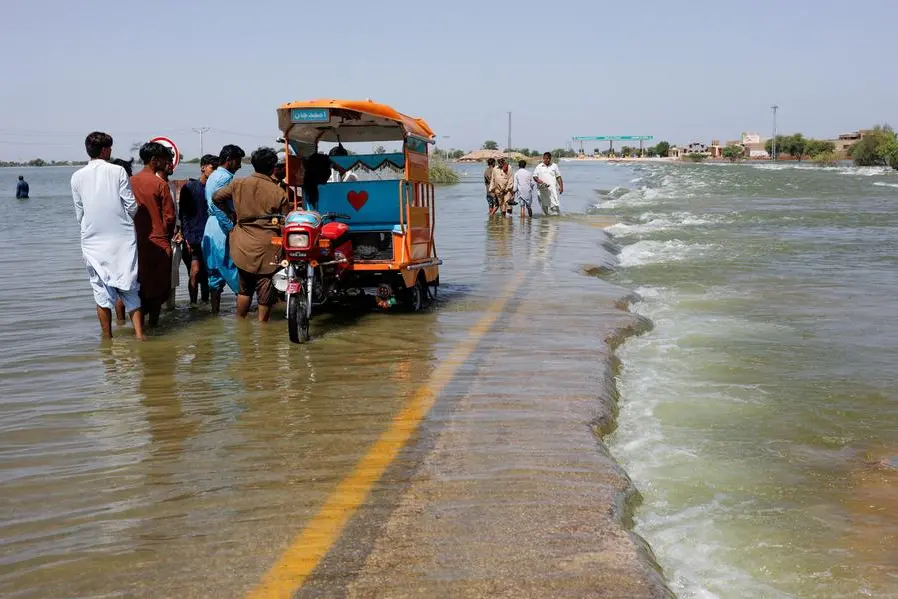PHOTO
ISLAMABAD - A damage, loss, and needs assessment following the unprecedented floods in Pakistan calls for ‘building back better’, based on the principles of the poor first, transparency, inclusion, and climate resilience. The assessment estimates total damages to exceed US$14.9 billion, and total economic losses to reach about US$15.2 billion.
Estimated needs for rehabilitation and reconstruction in a resilient way are at least US$16.3 billion, not including much-needed new investments beyond the affected assets, to support Pakistan’s adaptation to climate change and overall resilience of the country to future climate shocks.
Housing; Agriculture and Livestock; and Transport and Communications sectors suffered the most significant damage, at US$5.6 billion, US$3.7 billion, and US$3.3 billion, respectively. Sindh is the worst affected province with close to 70 percent of total damages and losses, followed by Balochistan, Khyber Pakhtunkhwa, and Punjab.
The Ministry of Planning, Development and Special Initiatives led the Post-Disaster Needs Assessment (PDNA), which was conducted jointly with the Asian Development Bank (ADB), the European Union (EU), the United Nations agencies with technical facilitation by the United Nations Development Programme (UNDP), and the World Bank. The PDNA, in addition to estimating damages, economic losses and recovery and reconstruction needs, also assesses broader macroeconomic and human impacts and recommends principles along which to develop a comprehensive recovery and reconstruction framework.
The floods affected 33 million people and more than 1730 lost their lives. They are particularly impacting the poorest and most vulnerable districts. The situation is still evolving, with floodwaters stagnant in many areas, causing water-borne and vector-borne diseases to spread, and more than 8 million displaced people now facing a health crisis. The crisis thus risks having profound and lasting impacts on lives and livelihoods. Loss of household incomes, assets, rising food prices, and disease outbreaks are impacting the most vulnerable groups. Women have suffered notable losses of their livelihoods, particularly those associated with agriculture and livestock.
The PDNA Human Impact Assessment highlights that the national poverty rate may increase by 3.7 to 4.0 percentage points, potentially pushing between 8.4 and 9.1 million more people below the poverty line.
Multidimensional poverty can potentially increase by 5.9 percentage points, implying that an additional 1.9 million households are at risk of being pushed into non-monetary poverty.
Compounding the existing economic difficulties facing the country, the 2022 floods are expected to have a significant adverse impact on output, which will vary substantially by region and sector. Loss in gross domestic product (GDP) as a direct impact of the floods is projected to be around 2.2 percent of FY22 GDP. The agriculture sector is projected to contract the most, at 0.9 percent of GDP. The damage and losses in agriculture will have spillover effects on the industry, external trade and services sectors.
The Government is providing immediate relief to the impacted communities and supporting the early recovery, while aiming to ensure macroeconomic stability and fiscal sustainability. Moving forward, as recovery and reconstruction spending rises, the loss in output could be mitigated. Yet, significant international support will be needed to complement Pakistan’s own commitment to increase domestic revenue mobilisation and save scarce public resources, and to reduce the risk of exacerbating macroeconomic imbalances.
The report puts forth recommendations for developing a comprehensive recovery framework. While the primary focus will be on the affected areas, such framework presents an opportunity to embed systemic resilience to natural hazards and climate change in Pakistan’s overall development planning. This tragic disaster can be a turning point, where climate resilience and adaptation, increased domestic revenue mobilisation and better public spending, and public policies and investments better targeted to the most vulnerable populations; all figure at the core of policymaking going forward.
The ADB, the EU, the UNDP and the World Bank are fully committed to working with the Government and people of Pakistan during the ensuing recovery phase, and to increase the country’s climate resilience




















